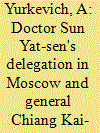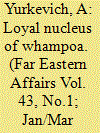| Srl | Item |
| 1 |
ID:
118591


|
|
|
|
|
| Publication |
2012.
|
| Summary/Abstract |
The author believes that the turning point in the career of Chiang Kai-shek, who had no significant authority in China's political and military circles in the early 1920s, was when he became the head of "Doctor Sun Yat-sen's Delegation" which visited Moscow in the autumn of 1923. The success of the mission helped Chiang Kai-shek take the post of the Commandant of the Whampoa Military Academy and subsequently set up military units under his command.
|
|
|
|
|
|
|
|
|
|
|
|
|
|
|
|
| 2 |
ID:
138474


|
|
|
|
|
| Summary/Abstract |
The article scans the history of Huangpu (Whampoa) Military Academy organized in 1924 with Soviet assistance and with the participation of Chinese communists. The author shows the significance of Huangpu Academy for the "symbolic policy" of the Kuomintang party (KMT) and the Communist Party of China, as well as the role of the Academy not only in the creation of the Kuomintang National Revolutionary Army and its military personnel training, but also in the formation of such vital institutions as organs of political education and propaganda, special services, and public organizations.
|
|
|
|
|
|
|
|
|
|
|
|
|
|
|
|
| 3 |
ID:
111855


|
|
|
|
|
| Publication |
2012.
|
| Summary/Abstract |
The author shows that the main evaluation criterion of financial and material assistance to Kuomintang in the 1920s should have been its effectiveness from the point of view of influence, first, on the fulfillment of the tasks of the Chinese national revolution, and secondly, on the achievement of Moscow's aims in China. On the basis of newly-circulated documents, the author shows that Soviet financial assistance in 1924-1925 was aimed at helping organize reliable and centrally-managed armed forces, as well as a workable party organization of Kuomintang and its greater efficiency.
|
|
|
|
|
|
|
|
|
|
|
|
|
|
|
|